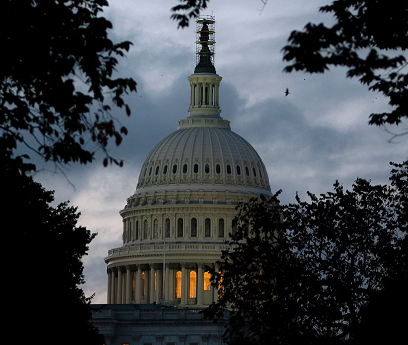
- Details
- By Levi Rickert
With less than three hours to spare, the U.S. Senate voted by a 88-9 margin shortly after 9 p.m. - EDT on Saturday night for a 45-day extension to fund the federal government through a continuing resolution (H.R. 5860). The legislation will be sent to the White House for President Joe Biden's signature which will avert the federal shutdown that has been looming in recent days. U.S. Senator Markwayne Mullin (R-OK), a Cherokee, the only Native American in the Senate for in favor of the bill.
The Senate took up the continuing resolution after the Republican-controlled House of Representatives passed the legislation on Saturday afternoon. The House vote that included votes by Democrats was 335 to 91.
Three of the four Native Americans serving in the House voted on the measure on Saturday. Mary Sattler Peltola (D-AK-At-Large), the first Alaska Native ever elected to Congress, who lost her husband on Sept. 12, 2023 in a plane accident, did not vote.
Rep. Tom Cole (R-OK-4th District), a tribal citizen of the Chickasaw Nation and Rep. Sharice Davids (D-KS-3rd District), who is a tribal citizen of the Ho-Chunk Nation voted yes on the continuing resolution.
Right-wing conservation, Rep. Josh Brecheen (R-OK-2nd District), a tribal citizen of the Choctaw Nation of Oklahoma, voted against the measure.
President Joe Biden released the following statement shortly after the Senate vote pass the continuing resolution:
"Tonight, bipartisan majorities in the House and Senate voted to keep the government open, preventing an unnecessary crisis that would have inflicted needless pain on millions of hardworking Americans. This bill ensures that active-duty troops will continue to get paid, travelers will be spared airport delays, millions of women and children will continue to have access to vital nutrition assistance, and so much more. This is good news for the American people.
But I want to be clear: we should never have been in this position in the first place. Just a few months ago, Speaker McCarthy and I reached a budget agreement to avoid precisely this type of manufactured crisis. For weeks, extreme House Republicans tried to walk away from that deal by demanding drastic cuts that would have been devastating for millions of Americans. They failed."
Rep. Tom Cole (R-OK-04), a tribal citizen of the Chickasaw Nation and vice chairman of the House Appropriations Committee, released the following statement after the U.S. House of Representatives advanced H.R. 5860, the Continuing Appropriations Act, which would keep the government open until November 17. Cole supported the legislation.
“House Republicans are passing our appropriations bills to provide full funding and have already sent four bills, which would fund nearly 70 percent of the discretionary budget, to the Senate. But we cannot shut down the government in the interim and punish the American people, our service members and civilian workforce,” Cole said in a statement on Saturday afternoon after the House of Representatives passed the legislation. “This legislation would avoid that while allowing Congress to finish the job and provide critical disaster relief to Hawaii which was devastated by wildfires.”
“Government shutdowns are not the way to govern and do not work as a negotiation tactic. I thank him for his leadership to avert a shutdown, something the previous four Republican Speakers did not do, and this body for working in a bipartisan manner for the good of the American people.”
Even though the Republicans control the House, in the end more Democrats voted to keep the government at current funding levels.
Rep. Sharice Davids (D-KS-03), a tribal citizen of the Ho-Chunk Nation, on Thursday released a video message reminding her colleagues of the real consequences of a government shutdown and calling for a bipartisan funding agreement.
More Stories Like This
Native News Weekly (August 25, 2024): D.C. BriefsUS Presidents in Their Own Words Concerning American Indians
Native News Weekly (January 18, 2026): D.C. Briefs
Federal Judge Orders ICE to Halt Use of Pepper Spray, Arrests of Peaceful Protesters in Twin Cities
Tunica-Biloxi Cultural Leader John D. Barbry Walks On
Help us defend tribal sovereignty.
At Native News Online, our mission is rooted in telling the stories that strengthen sovereignty and uplift Indigenous voices — not just at year’s end, but every single day.
Because of your generosity last year, we were able to keep our reporters on the ground in tribal communities, at national gatherings and in the halls of Congress — covering the issues that matter most to Indian Country: sovereignty, culture, education, health and economic opportunity.
That support sustained us through a tough year in 2025. Now, as we look to the year ahead, we need your help right now to ensure warrior journalism remains strong — reporting that defends tribal sovereignty, amplifies Native truth, and holds power accountable.
 The stakes couldn't be higher. Your support keeps Native voices heard, Native stories told and Native sovereignty defended.
The stakes couldn't be higher. Your support keeps Native voices heard, Native stories told and Native sovereignty defended.
Stand with Warrior Journalism today.
Levi Rickert (Potawatomi), Editor & Publisher

